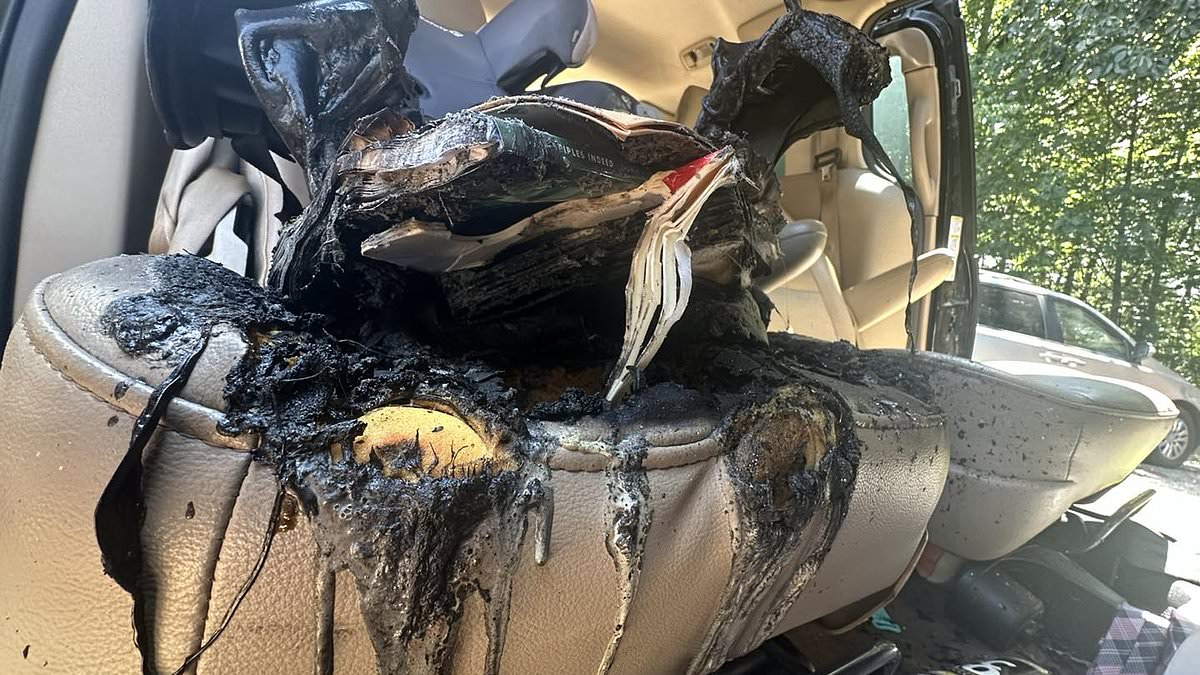A child’s car seat spontaneously erupted into flames moments after a family had all left the mini van and gone inside their home.
The fire had been noticed by a neighbor who spotted smoke coming from the mini van after the family had returned home from church in North Carolina on Sunday.
A family member used a garden hose to put the flames out. No one was in the car at the time and there were no injuries.
But pictures from the scene showed how the fire had completely melted through the child’s plastic seat and the leather car seat.
Investigators have now revealed the shocking reason for the sudden fire was due to the small lithium battery inside the child’s book overheating.
The George Hildebran Fire & Rescue Department arrived at the scene and determined it was ‘Button Battery’ inside the book that had been underneath the seat which caused the fire.
Fire Chief Bobby Craig told news source WSOC: ‘The world itself is moving to lithium batteries, which propose some of these troubles to the fire service.
‘I don’t know if there is – other than trying to keep them cool – that there is any precautions.’
The fire department has decided to keep the safety seat for training purposes to show the danger of lithium batteries.
Lithium-ion batteries, particularly poor-quality ones, are susceptible to uncontrolled thermal runaway events, which occur when the temperature in lithium-ion batteries increases faster than the energy can be dispersed to its surroundings.
The high temperature causes the battery to decompose, creating more heat and ultimately leading to an explosion of flammable gas.
They are found in many household products, including mobile phones, laptops, tablets, e-scooters, e-bikes and power tools.
The recent rise in the use of lithium-ion batteries has caused havoc for a number of industries, including waste companies, with rubbish and recycling trucks sparking fires when crushing wrongly disposed-of batteries.
A number of social media users posted expressing their alarm at the close call in North Carolina.
Kevin Stamey wrote: ‘Thats scary folks. You know how many childrens toys and such have those batteries in them? Think about it.’
Vickie Smith said: ‘That’s scary! So many kids toys and books have batteries. I’m so glad the child wasn’t injured.’
Faith Vankley commented: ‘Thank God the child wasn’t burned; that needs to be looked into! Yikes!’
The book, Cocomelon J.J.’s Potty Time, was written and published by the company Cottage Door Press which describes itself as a producer of ‘high-quality children’s books’.
has contacted Cottage Door Press regarding the incident.
Monitor charging times of lithium-ion products and disconnect products from chargers once they are fully charged. Consider setting timers as a reminder to unplug products.
Keep lithium-ion batteries out of household garbage or recycling bins and kerbside hard waste collections.
Charge lithium-ion batteries and products away from combustible materials such as beds, sofas or carpet.
Store batteries and lithium-ion products in cool, dry places and out of direct sunlight, including while charging.
Do not use batteries, products or chargers that are overheating or showing signs of failure such as swelling, leaking or venting gas.
Check the charger you are using is suitable for the product being charged.
Allow time for batteries to cool after use and before charging.
Ensure a functioning smoke alarm is installed in your home or caravan/motorhome if you store products containing lithium-ion batteries inside or use a solar energy storage system powered by a lithium-ion battery.
Source: The n Competition and Consumer Commission
